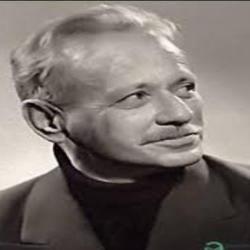
Mikhail Sholokhov
Russia, Novelist
| Date of Birth | : | 24 May, 1905 |
| Date of Death | : | 21 Feb, 1984 |
| Place of Birth | : | Veshenskaya, Russia |
| Profession | : | Novelist |
| Nationality | : | Russian |
Mikhail Aleksandrovich Sholokhov 1905, Veshenskaya was a Russian novelist, winner of the 1965 Nobel Prize for Literature for his novels and stories about the Cossacks of southern Russia.
After joining the Red Army in 1920 and spending two years in Moscow, he returned in 1924 to his native Cossack village in the Don region of southern Russia. He made several trips to western Europe and in 1959 accompanied the Soviet leader Nikita Khrushchev to the United States. He joined the Communist Party in 1932 and became a member of the Central Committee in 1961.
Sholokhov began writing at 17, his first published book being Donskie rasskazy (1926; Tales of the Don), a collection of short stories. In 1925 he began his famous novel Tikhy Don (The Silent Don). Sholokhov’s work evolved slowly: it took him 12 years to publish Tikhy Don (4 vol., 1928–40; translated in two parts as And Quiet Flows the Don and The Don Flows Home to the Sea) and 28 years to complete another major novel, Podnyataya tselina (1932–60; translated in two parts as Virgin Soil Upturned [also published as Seeds of Tomorrow] and Harvest on the Don). Oni Srazhalis za rodinu (1942; They Fought for Their Country) is an unfinished epic tale of the Soviet people’s bravery during the German invasion of World War II. Sholokhov’s popular story Sudba cheloveka (1957; “The Fate of a Man”) also focused on this period.
Quotes
Total 7 Quotes
And over the village slipped the days, passing into the nights; the weeks flowed by, the months crept on, the wind howled, and glassified with an autumnal, translucent, greenish-azure, The Don flowed tranquility down to the sea.
Boshafte Wahrheiten sind nur dann gut, wenn kein Fremder sie liest.
When swept out of its normal channel, life scatters into innumerable streams. It is difficult to foresee which it will take in its treacherous and winding course. Where today it flows in shallows, like a rivulet over sandbanks, so shallow that the shoals are visible, tomorrow it will flow richly and fully.
No matter how bad the lord is, the lout become a lord is ten times worse.
In broad daylight it's terrible for a man to face his death; but when you're asleep it ought to be easy enough.
When swept out of its normal channel, life scatters into innumerable streams. It is difficult to foresee which it will take in its treacherous and winding course. Where today it flows in shallows like a rivulet over sandbanks, so shallow that the shoals are visible, tomorrow it will flow richly and fully.
The grass grows over the graves, time overgrows the pain. The wind blew away the traces of those who had departed; time blows away the bloody pain and the memory of those who did not live to see their dear ones again—and will not live, for brief is human life, and not for long is any of us granted to tread the grass.
